Data Analysis and Findings
Introduction
The research study has collected data using the questionnaire survey method. It was participated by 54 respondents, each of whom provided their valuable feedback about the operational value and effectiveness of vocabulary learning applications. The responses obtained in this process has been statistically analysed using SPSS tool.
Descriptive Data Analysis
Table 1: Gender of Respondents
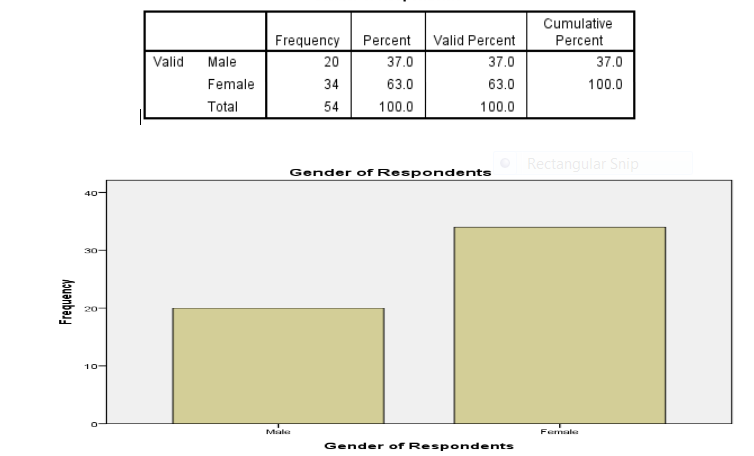
From the above table, it is seen that out of the total 54 respondents, 34% were females while males accounted for only 20%. Taking into consideration the data findings, it can be said that responses of both genders have been collected relating to the effectiveness and vocabulary of learning applications.
Table 2: Mobile Phone Usage
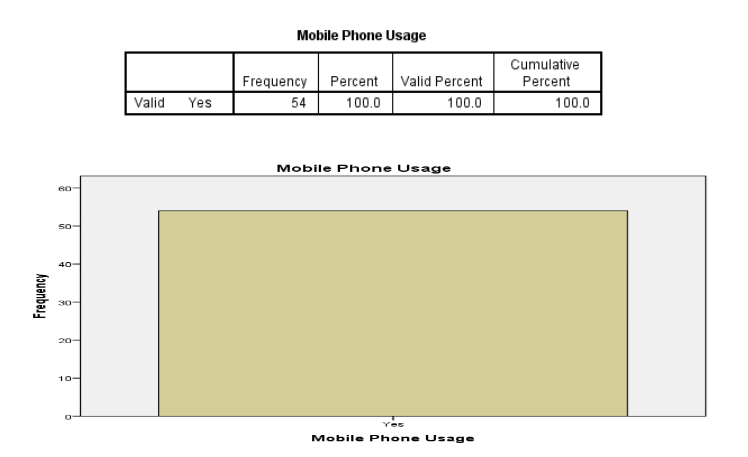
Mobile phones are used by almost every student in the present context. In the context of this study, the use of mobile phone seems to be crucial as a means of determining whether the students are engaged in the learning process from vocabulary learning apps The data findings in the above table indicates that all the 54 respondents who took part in the data collection process, everyone one of them uses mobile phones in their daily life.
Table 3: Total Usage Period of Vocabulary Learning Applications
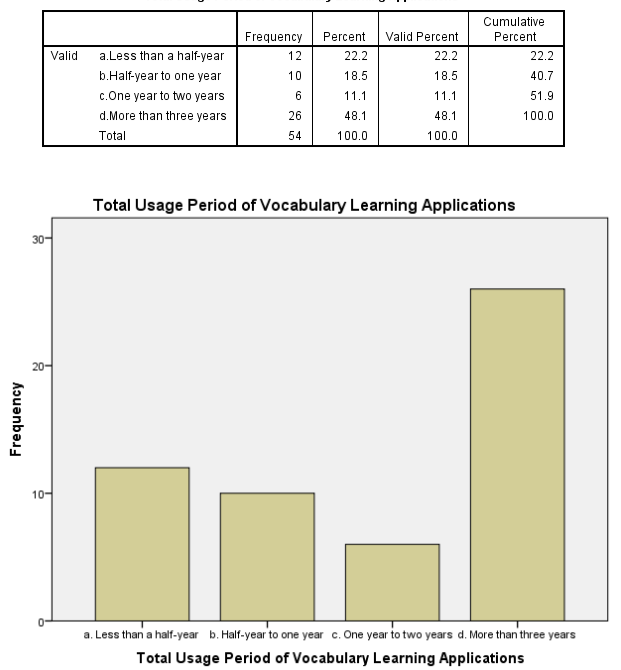
Nearly 48.15% of the respondents, have been found to use vocabulary-learning applications for more than three years. It has been identified to be the usage period of maximum number of respondents who took part in the data collection process. It is to be also noted that 18.52% of the respondents has been using the app for a period of six month to one year while 22.22% of them for less than six months also. On the other hand, the minimum number of respondents, 11.11% stated that they have been using such app for one or two year.
Table 4: Usage Tendency of Vocabulary Learning Apps
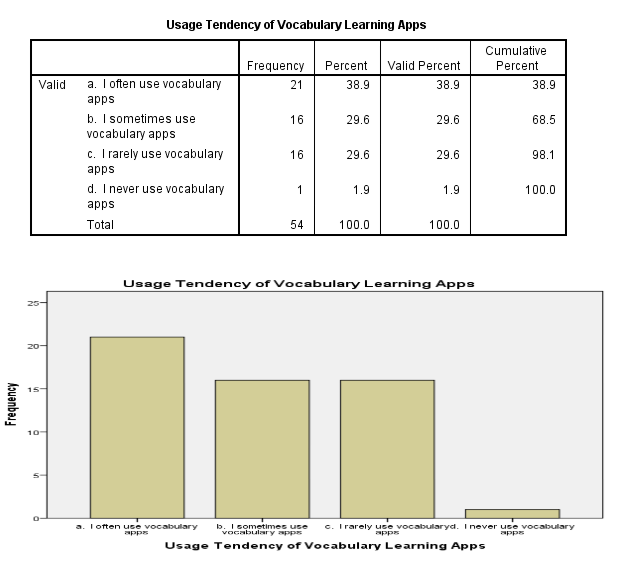
Majority of the respondent, 38.89% in this case said that they use vocabulary apps quite often while 1.8% of the respondents said that they never use such application. Furthermore, 29.63% of the respondents each said that they sometime use such apps and rarely they have come across its usage.
Table 5: Favourable Vocabulary Learning Apps
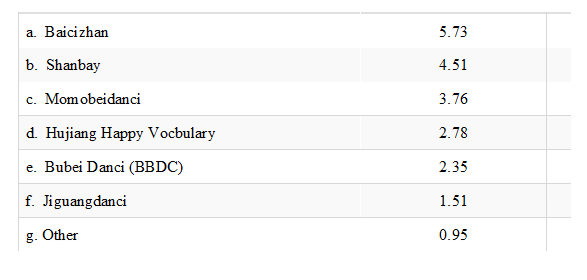
The respondents were asked about the name of the vocabulary apps that they use as a part of learning process. The apps considered for the data collection process were Baicizhan, Shanbay, Momobeidanci, Huijang Happy Vocabulary, Bubei danci (BBDC), Jiguangdanci and others. In this case, respondents have shared maximum vote for Baicizhan while the least used vocabulary learning application identified is Jiguangdanci. On the other hand, the vocabulary mobile learning apps like Shanbay, Momobeidanci, Huijang Happy Vocabulary, Bubei danci (BBDC) and Jiguangdanci occupies the second, third, fourth, fifth and sixth position respectively.
Table 6: Feedback Sharing Effectiveness of the Apps
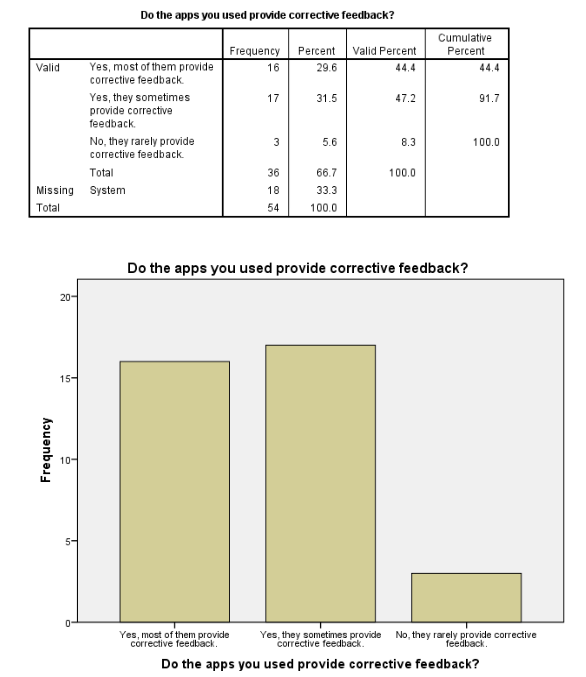
The majority of the respondents, comprising of 48.65% said that the vocabulary app used by them sometimes provide corrective feedback while only 8.11% of them said that they rarely get corrective feedback from such apps. It is to be also noted that 43.24% of the respondents said that they sometimes provide correct feedback as a part of the learning process. However, there were no respondents who said that they have never received any corrective feedback from the learning apps.
Table 7: Vocabulary Learning Effectiveness
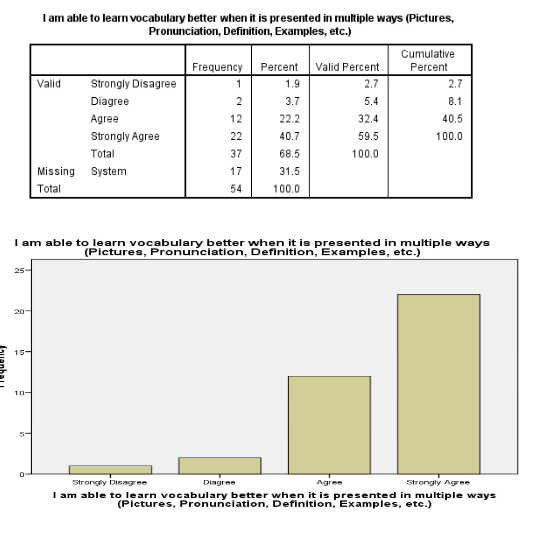
From the above table, it can be seen that majority of the respondents, 59.64% strongly agree with the fact that they have been able to learn vocabulary in a better manner in situations when it is being presented using pictures, definition, examples, pronunciations, etc. It is to be also noted that 32.43% of the respondents agrees with the statement. However, only 2.7% of the respondents strongly disagrees with the statement.
Table 8: Vocabulary Activities
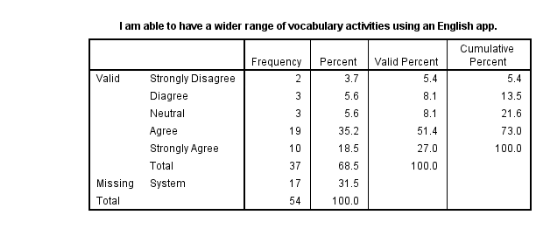
Majority of the respondents, 51.35% agree with the statement they are able to access a wide range of vocabulary activities using an English app. Furthermore, 27.03% of the respondents strongly agree with the statement while 8.11% of them shared a neutral response. However, only 5.41% of the respondents strongly disagree with the statement.
Table 9: Fun Filled Vocabulary Knowledge Testing
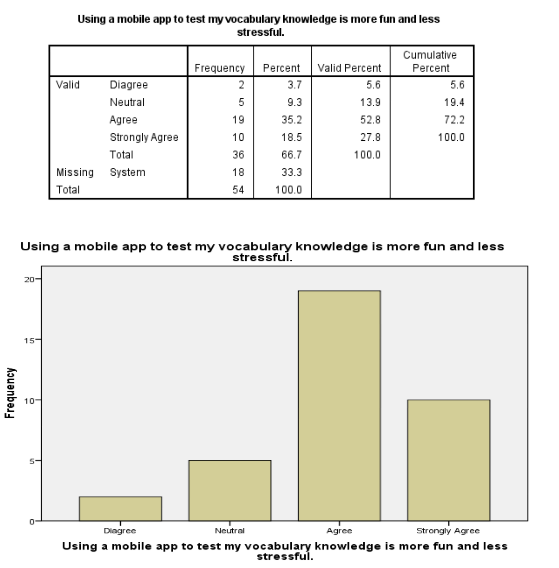
The above table highlights that majority of the respondents, 51.35% agree with the statement along with 27.03% of them strongly agreeing to the statement that a mobile app help in the process of testing their vocabulary in a less stressful and fun manner. However, only 8.11% of the respondents disagree with the statement.
Table 10: Additional Information Access
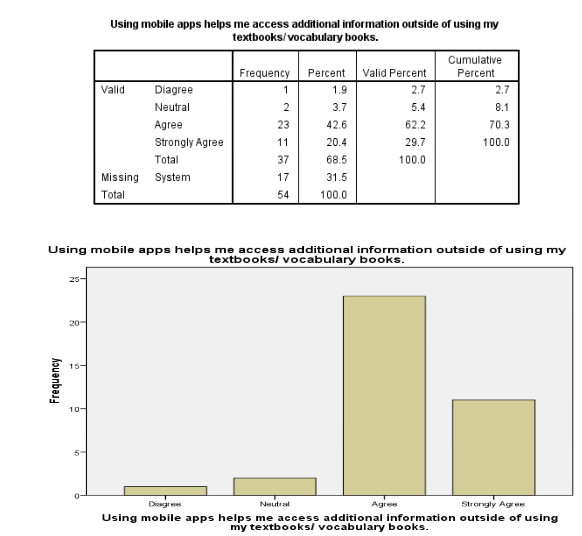
The above table highlights that majority of the respondents, 62.16% agree and 29.73% of them strongly agreeing with the statement that a mobile app help in the process of accessing a wide range of information that is external to their textbooks and even vocabulary books too. However, only 2.7 % of the respondents disagree with the statement.
Table 11: Learning Enjoyment
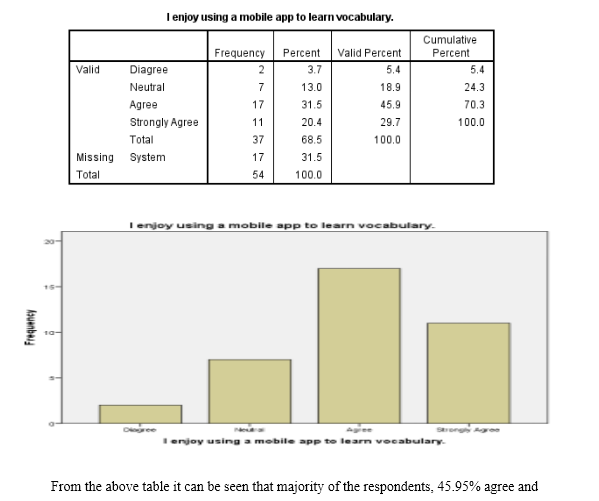
From the above table it can be seen that majority of the respondents, 45.95% agree and 29.73% of them strongly agree to the statement that they seem to enjoy while using the app for learning vocabulary. However, only 5.41 % of the respondents disagree with the statement.
Table 12: Performance Enhancement
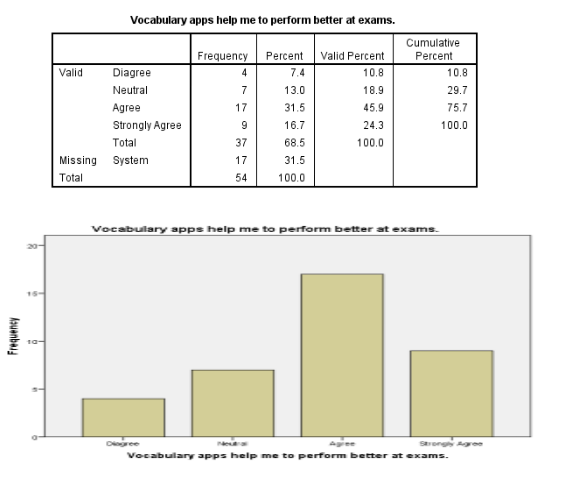
The above table states that maximum number of the respondents comprising of 45.95% agree with the statement that vocabulary apps help them in performing better in examinations. The statement was strongly agreed by 24.32% of the respondents too. However, only 10.81 % of the respondents disagreed with the statement.
Table 13: Role of Mobile Phones in Learning Vocabulary
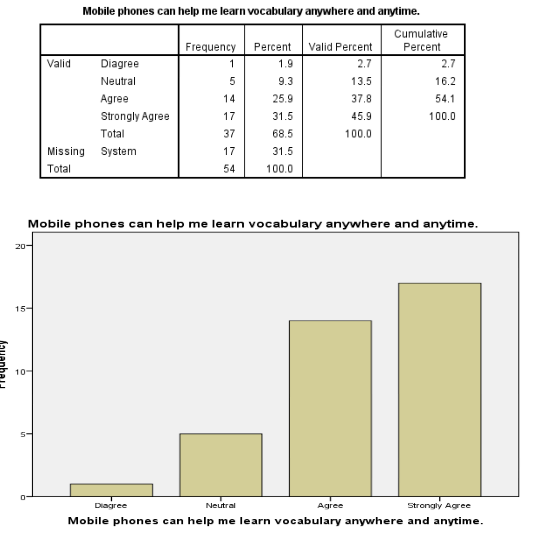
The above table stated that maximum number of respondents 37.84% agree with the statement that mobile phones help in the process of learning vocabulary anytime and anywhere. Furthermore, 45.95% of them strongly agree to the statement while 13.51% shared a neutral response. On the other hand, only 2.7% of the respondents disagree with the statement.
Table 14: Vocabulary Learning Effectiveness via Mobile Phones
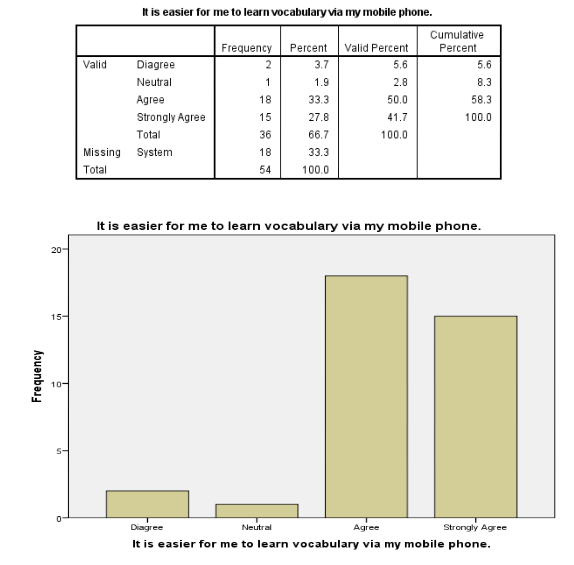
Based on the above table, it can be seen that maximum number of respondents 51.35% agree with the statement that mobile phones help in the process of making the vocabulary learning process easier. Furthermore, 40.54 % of them strongly agree to the statement while 2.7% shared a neutral response. On the other hand, only 5.41% of the respondents disagree with the statement.
Table 15: Mobile Phone Based Learning as a Part of Curriculum
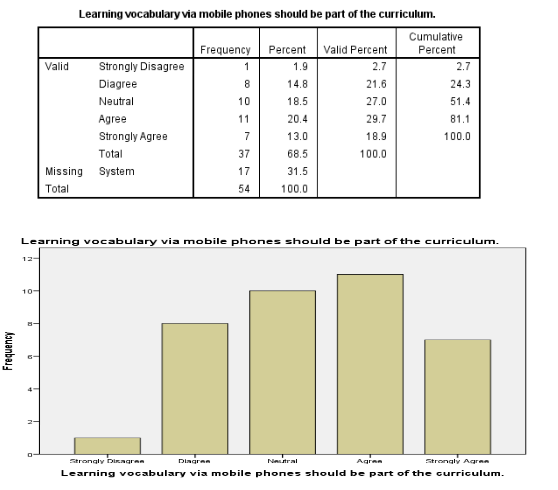
The above table findings state that that maximum number of respondents 29.73% agree with the statement that vocabulary learning through mobile phones must be made a part of the curriculum. Furthermore, 18.92 % of them strongly agree to the statement while 27.03% shared a neutral response. On the other hand, 21.62%% of the respondents disagree with the statement.
Table 16: Confidence Development
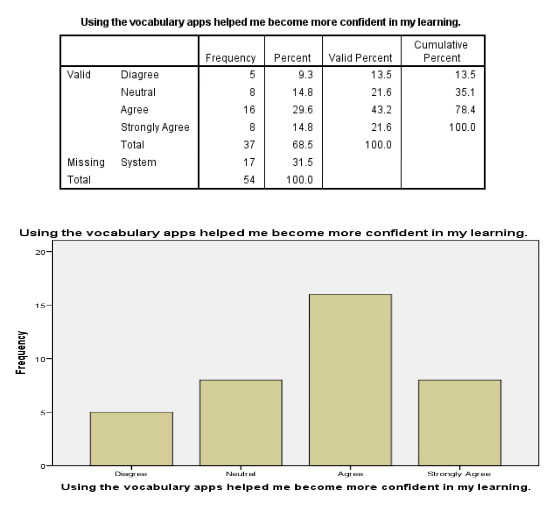
From the above table findings, it is seen that majority of respondents 43.24% agree with the statement that use of vocabulary learning applications helps in developing confidence. Furthermore, 21.62% of them each strongly agree to the statement and even shared a neutral response respectively. On the other hand, 13.51% of the respondents disagree with the statement that that use of vocabulary learning applications helps in developing confidence.
Table 17: Stress Handling
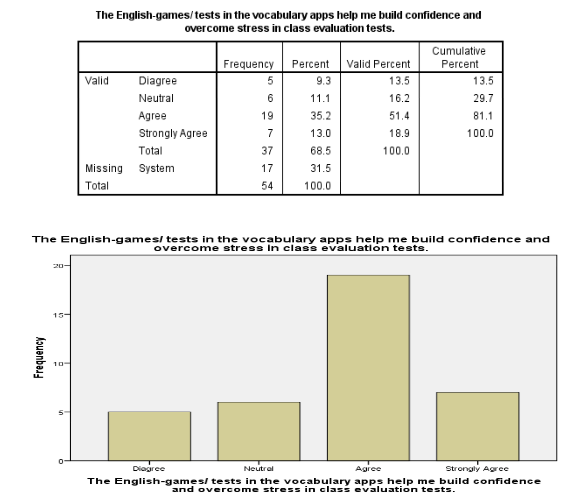
The above table findings state that that maximum number of respondents 51.35% agree with the statement that the English or tests in vocabulary learning apps helps in the process of developing confidence and at the same time overcome stress during evaluation tests. Furthermore, 18.92 % of them strongly agree to the statement while 16.22% shared a neutral response. On the other hand, 13.51% of the respondents disagree with the statement.
Table 18: Usage Effectiveness of Vocabulary Apps over Web Browsing
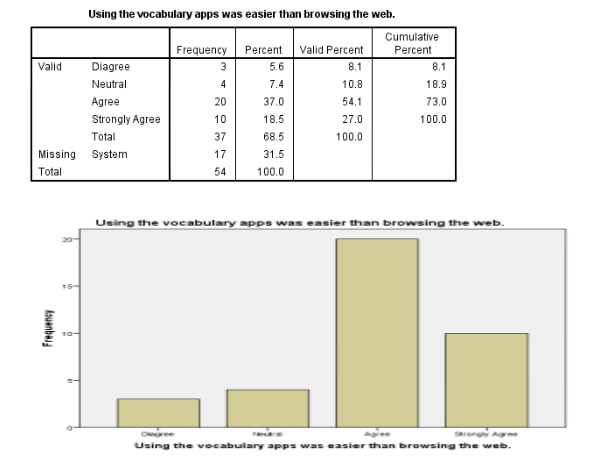
The above table findings state that that majority of the respondents who took part in the survey, comprising of 54.05% agree with the statement that the vocabulary learning apps are much easier in terms of usage when compared to web browsing. Furthermore, 27.03 % of them strongly agree to the statement while 10.81% shared a neutral response. On the other hand, 27.03% of the respondents disagree with the statement.
Table 19: Effectiveness of Mobile Vocabulary Learning Apps
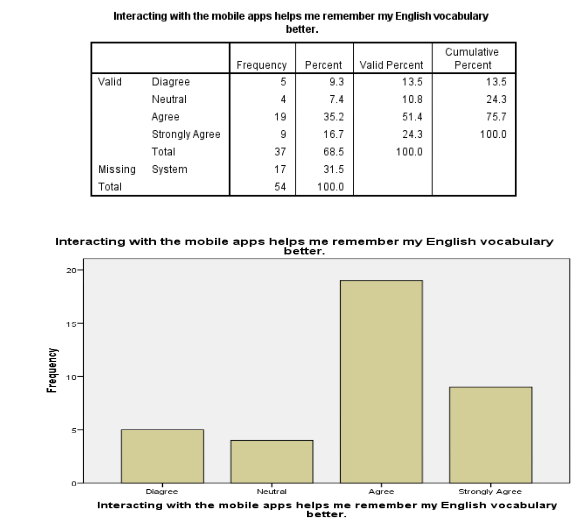
The above table findings state that that majority of the respondents who took part in the survey, comprising of 51.35% agree with the statement that the interaction with mobile apps plays a notable role in terms of remembering English vocabulary in a better manner. Furthermore, 24.32 % of them strongly agree to the statement while 10.81% shared a neutral response. On the other hand, 27.03% of the respondents disagree with the statement that the interaction with mobile apps plays a notable role in terms of remembering English vocabulary in a better manner.
Table 20: Quick Access to Study Materials
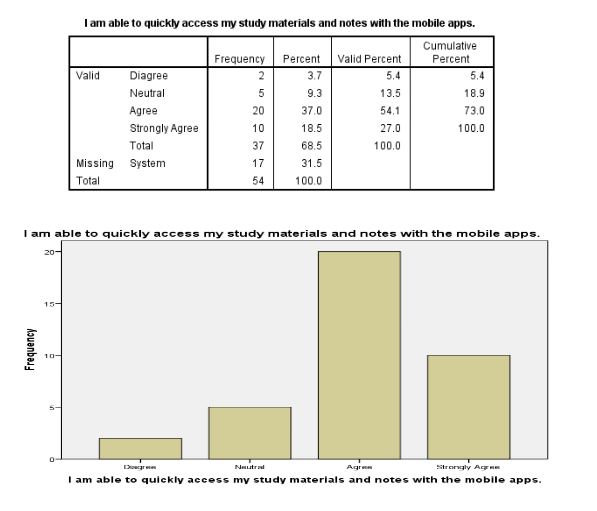
Taking into consideration, the above table findings it is quite evident that maximum number of respondents who took part in the survey, accounting for about 54.05% agree with the statement that mobile apps offers quick access to the study materials and even notes. Furthermore, 27.03 % of them strongly agree to the statement while 13.51% shared a neutral response. On the other hand, 5.41% of the respondents disagree with the statement.
Table 21: Accessibility of Vocabulary Apps over Books
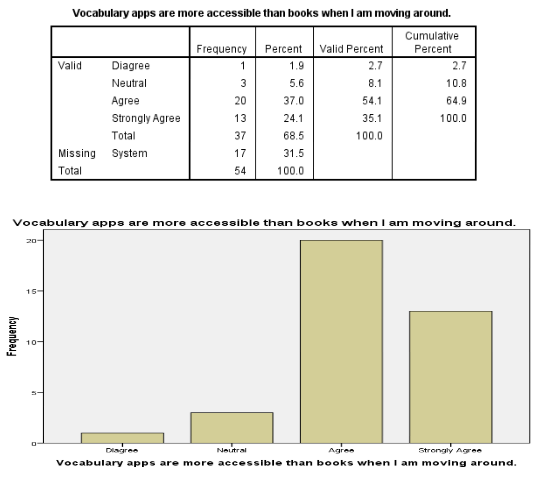
The above table highlight that majority of the respondents who took part in the survey, comprising of 54.05% of the total agree with the statement vocabulary apps provides better accessibility when compared with book as a part of moving around. On the other hand, 2.7% of the respondents disagree with the statement that vocabulary apps provide better accessibility when compared with book as a part of moving around.
Table 22: Learning Effectiveness
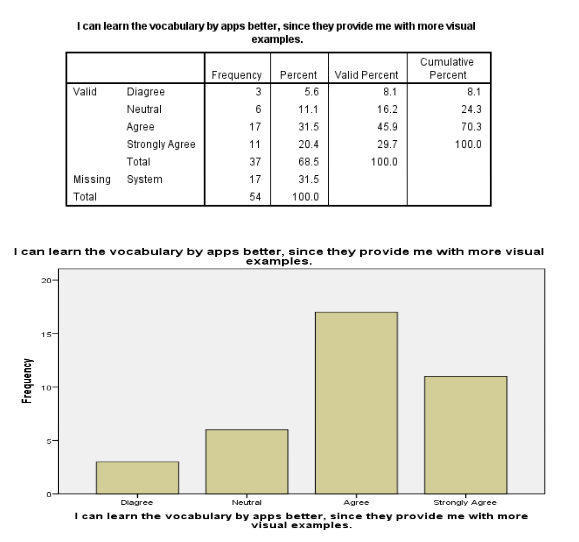
The above table signifies that majority of the respondents who took part in the survey, comprising of 45.95% of the total agree with the statement the visual examples aids the process of learning vocabulary in a better and effective manner. On the other hand, 8.11% of the respondents disagree with the statement that vocabulary apps help in providing them with better learning opportunities due to the presence of visual examples.
Table 23: Confidence Development Towards Classroom Evaluation Tests
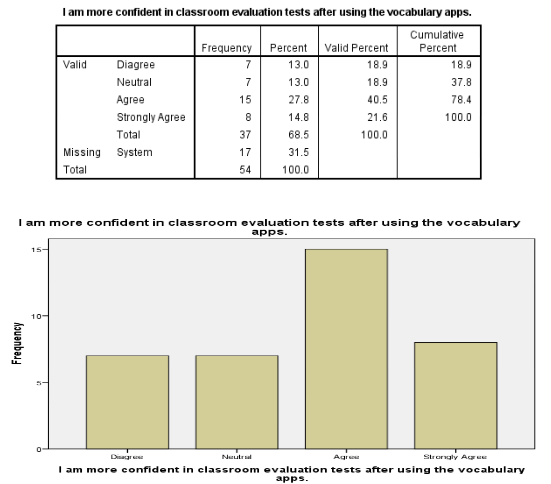
The above table highlights that majority of the respondents who took part in the survey, 40.54% agree with the statement that vocabulary apps helps in developing confidence required for succeeding in evaluation tests. On the other hand, 18.92% of the respondents also disagree with the statement that vocabulary apps help in developing confidence required for succeeding in evaluation tests.
Table 24: Increase in Level of Confidence
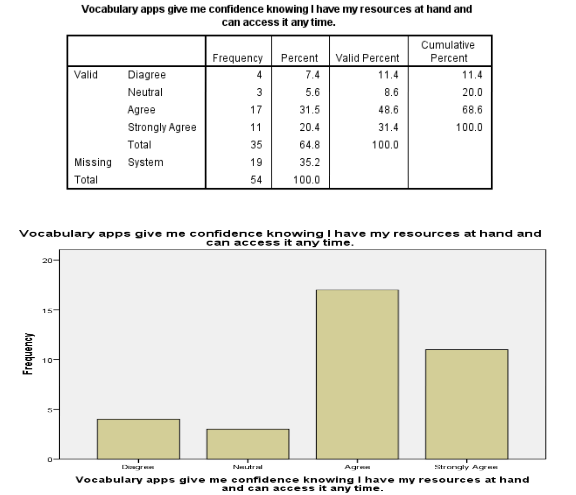
The above table highlighted that majority of the respondents who took part in the survey, 51.35% agree with the statement that vocabulary apps helps in developing their confidence since it provides with easily accessible resources. On the other hand, 10.81% of the respondents disagree with the statement that vocabulary apps help in developing their confidence since it provides them with the opportunity to easily access resources.
Table 25: Communication Performance Enhancement
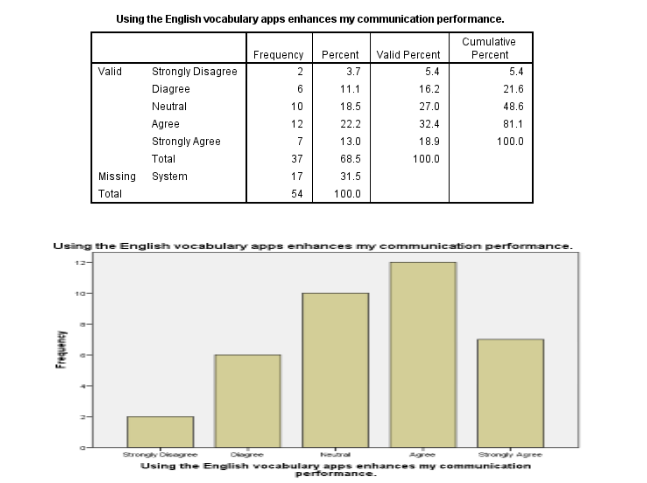
The above table signified that maximum number of respondents who took part in the questionnaire data collection process, 32.43% agree with the statement that vocabulary apps helps them in developing their English communication performance. On the other hand, 16.22% of the respondents disagree with the statement.
Table 26: Better Interactivity with Others
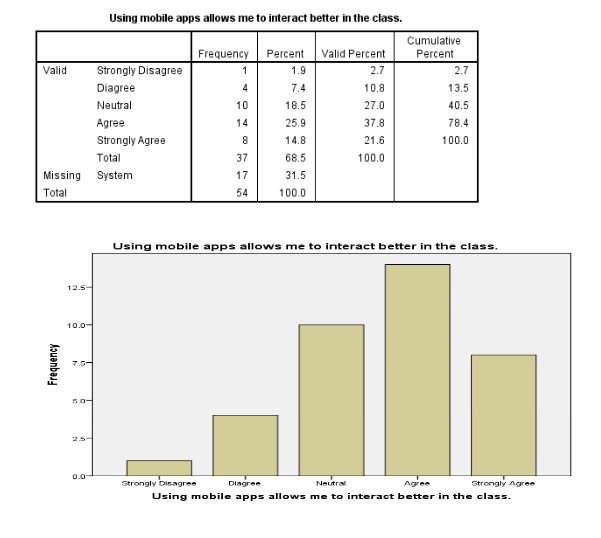
From the above table, it can be seen that maximum number of respondents, 37.84% who took part in the questionnaire data collection process agree with the statement that the use of mobile apps has helped them in interacting with the members of the class in a better manner. On the other hand, 10.81% of the respondents disagree with the statement.
Table 27: Ability to Take up Challenges
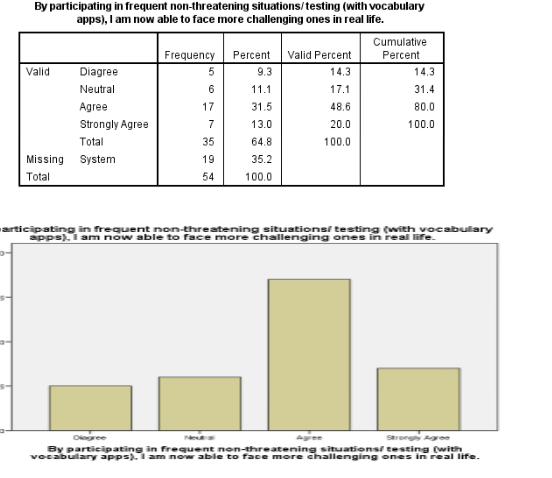
Majority of the respondents, 51.3% who took part in the questionnaire data collection process agreed with the fact that with the use of vocabulary learning apps, they have encountered various non-threatening situations or testing. As a result, they have successfully developed the skills required to deal with real life challenges. On the other hand, 13.51% of the respondents disagree with the statement.
Table 28: Learning Flexibility of Vocabulary Apps
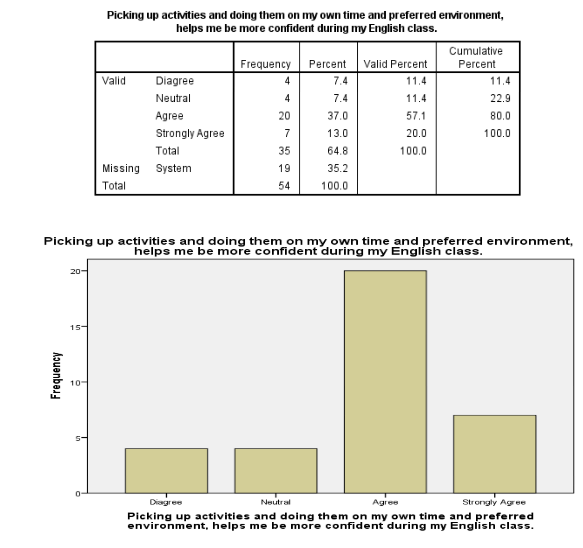
The above table highlighted that majority of the respondents, 59.64% who took part in the questionnaire data collection process agreed to the fact that flexibility offered by the vocabulary apps in terms of picking of activities and doing them as per own convenience helps in confidence development. Furthermore, 18.92 % of them strongly agree to the statement. On the other hand, 10.81% of the respondents disagree with the statement.
Table 29: Practical Knowledge Gaining Process
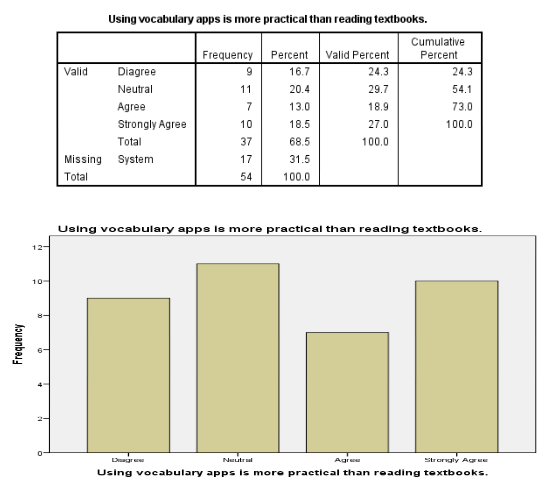
The above table has portrayed data collected in the context of determining the extent to which vocabulary apps offer practical knowledge to the respondents over reading books. In this context, 18.92%, maximum number of respondents agreeing to the statement while 27.03% strongly agree to the context. However, 24.32% of the respondents disagreed with the effectiveness of vocabulary apps in terms of offering practical knowledge when compared to reading books.
Table 30: Improvement in Listening and Reading Skills
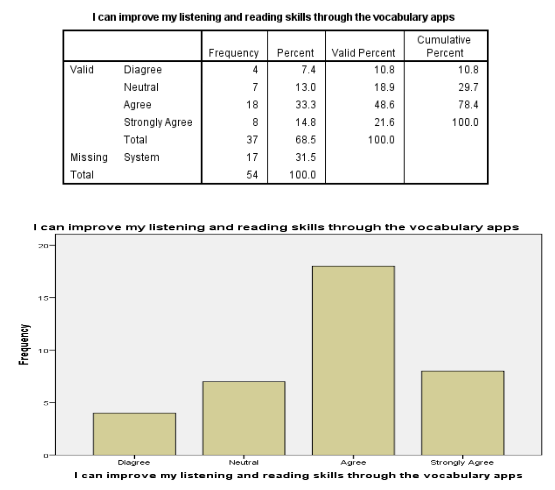
From the above table, it can be seen that the vocabulary learning apps plays a crucial role in terms of improving both the reading and listening skills of the respondents. It is due to the fact that maximum number of respondents, 48.65% agreed to the statement. However, 18.92% shared a neutral response in this context with 10.81% of the respondents disagreeing to the statement.
Table 31: Improvement in Speaking and Writing Skills
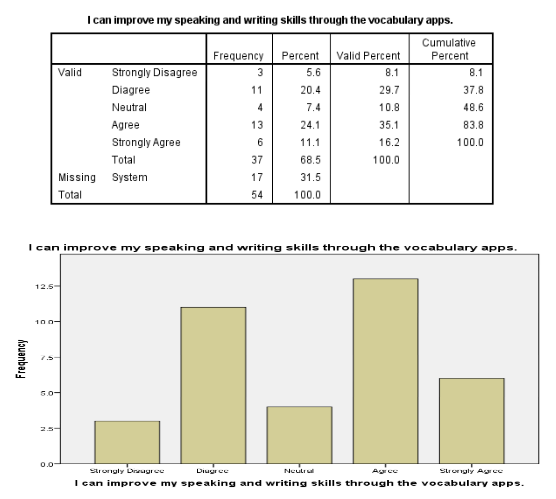
The above table highlighted that majority of the respondents, 35.14% who took part in the questionnaire data collection process agreed to the statement that are able to improve their speaking and writing ability largely through the use of vocabulary apps. Furthermore, 16.22 % of them strongly agree to the statement. On the other hand, 29.73% of the respondents disagree with the statement.
Table 32: Distraction Caused by Other Apps
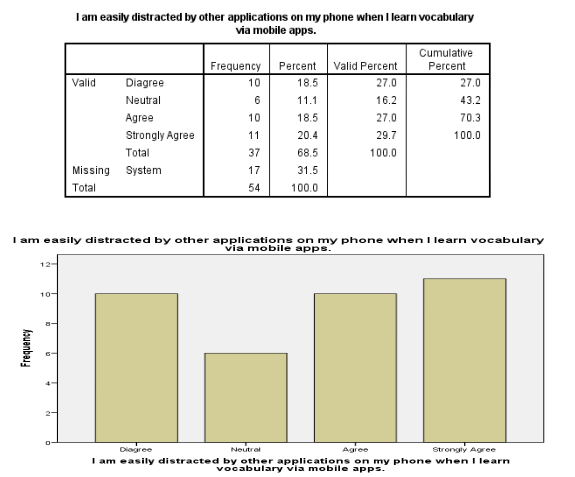
The above table highlighted that majority of the respondents, 27.03% who took part in the questionnaire data collection process agreed to the fact that they get easily distracted to other applications installed in their phone as a process of learning vocabulary using mobile apps. On the other hand, 27.03% of the respondents disagreed with the statement.
Table 33: Learning Ineffectiveness Due to Small Screen of Mobile Phones
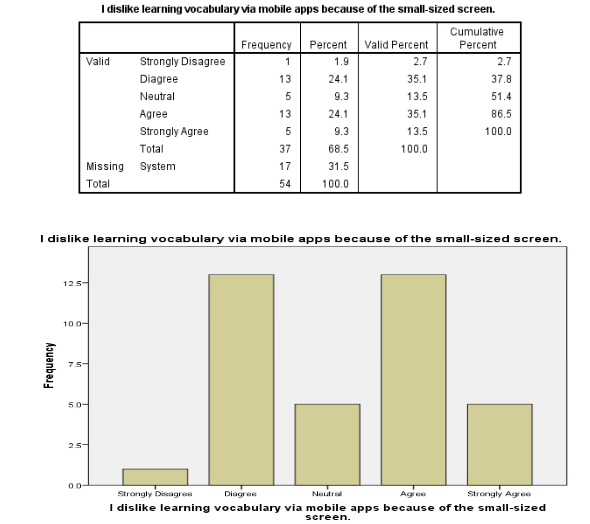
The respondents were asked about their disliking in using vocabulary mobile learning apps due to the small size of the screen. In this context, a neutral response was obtained since 35.14% of the respondents agreed to the statement while 35.14% of them disagreed too. On the other hand, 2.7% of the respondents strongly disagreed with the fact.
Table 34: Improvement in Spelling and Grammar
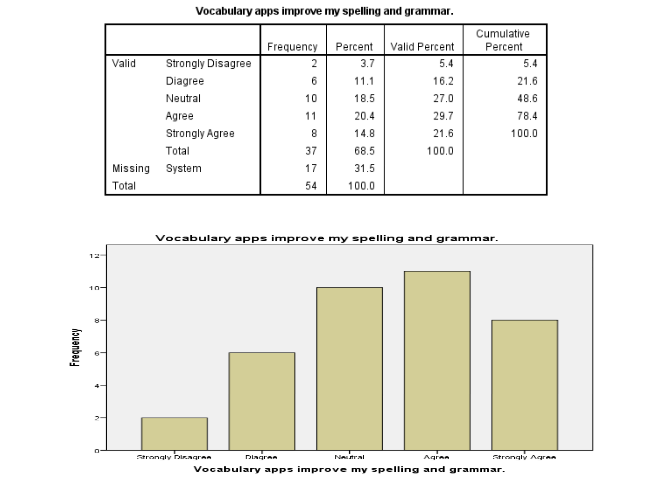
The above table highlighted that majority of the respondents, 29.73% who took part in the questionnaire data collection process agreed to the statement that vocabulary learning apps play a major role in terms of improving their spelling and grammar. On the other hand, 16.22% of the respondents disagree with the statement.
Table 35: Development of Autonomous Learning Skills
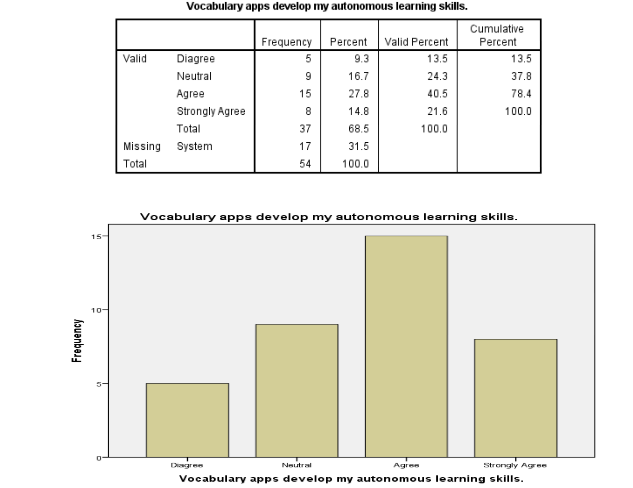
The above table highlighted that majority of the respondents, 40.54% who took part in the questionnaire data collection process agreed to the statement that vocabulary learning apps helps in development of autonomous learning skills. On the other hand, 13.51% of the respondents disagree with the statement that vocabulary learning apps helps in developing autonomous learning skills.
Table 36: Disturbance Caused Due to Slow Speed of Mobile Internet
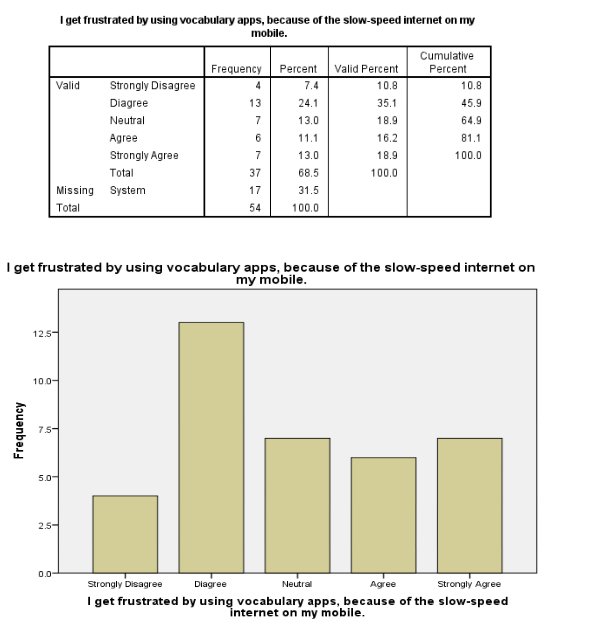
The above table highlighted that majority of the respondents, 35.14% who took part in the questionnaire data collection process disagreed to the statement that they get frustrated with the slow internet connectivity on mobile as a part of using the vocabulary learning apps . On the other hand, 10.81% of the respondents disagree with the statement while 16.22% of them agreed that slow speed of internet makes them frustrated in using mobile app-based vocabulary learning.
Table 37: Time Required for Mastering
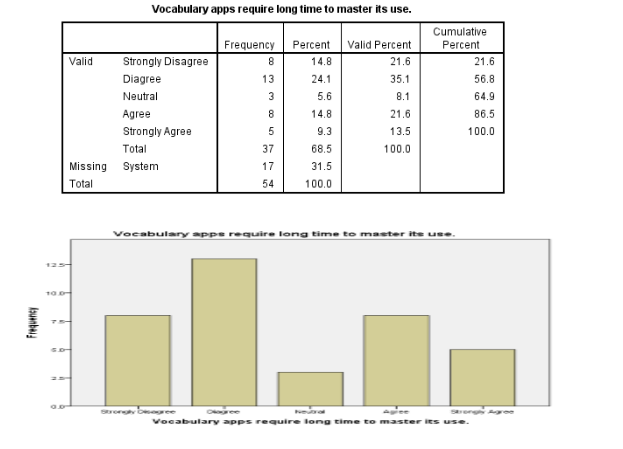
The above table highlighted that majority of the respondents, 35.14% who took part in the questionnaire data collection process disagreed to the statement that they took a large amount of time in terms of mastering the use of vocabulary apps. On the other hand, 8.11% of the respondents shared a neutral response along with 13.51% of them strongly agreeing to the fact that the require time in terms of mastering the use of vocabulary learning apps.
Table 38: Helpfulness in terms of Tests
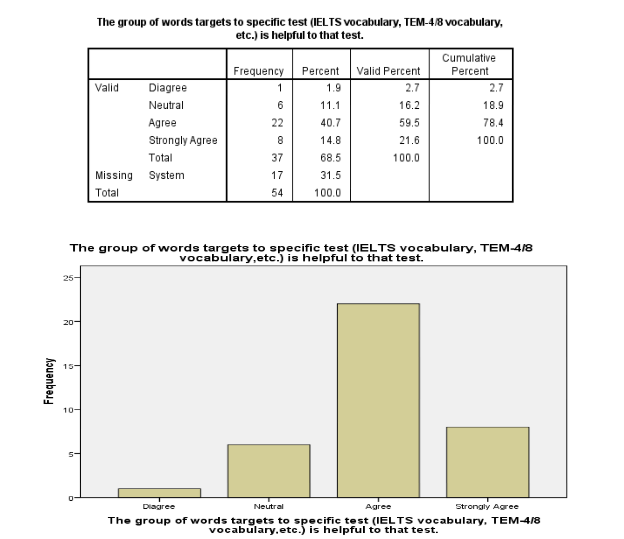
The above table highlighted that majority of the respondents, 59.46% who took part in the questionnaire data collection process agreed to the statement that vocabulary apps help in several tests like IELTS vocabulary and TEM-4/ to be few. On the other hand, only 2.7% of the respondents disagree with the statement.
Table 39: Feedback Sharing Effectiveness
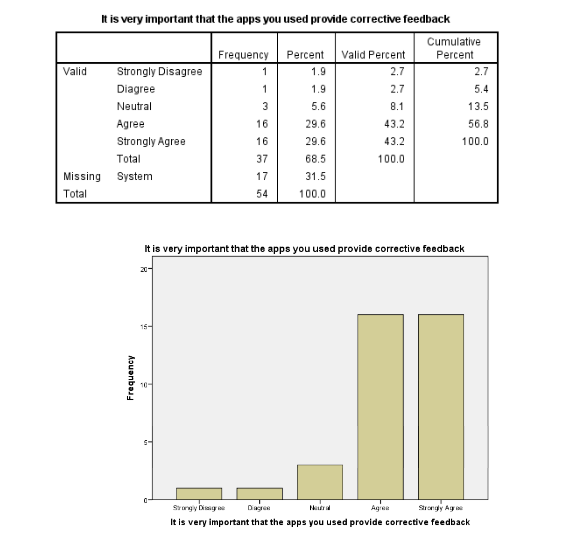
The above table highlighted that majority of the respondents, 43.24% who took part in the questionnaire data collection process strongly agreed and even another 43.24% of them also agreed with the fact that the vocabulary apps used for the purpose of learning helps them in offering corrective feedback. On the other hand, only 2.7% of the respondents disagree and even another 2.7% of them strongly disagree with the statement that vocabulary learning apps provides them with constructive feedback on the degree of progress made.
Table 40: Vocabulary Items Taught as Isolated Units
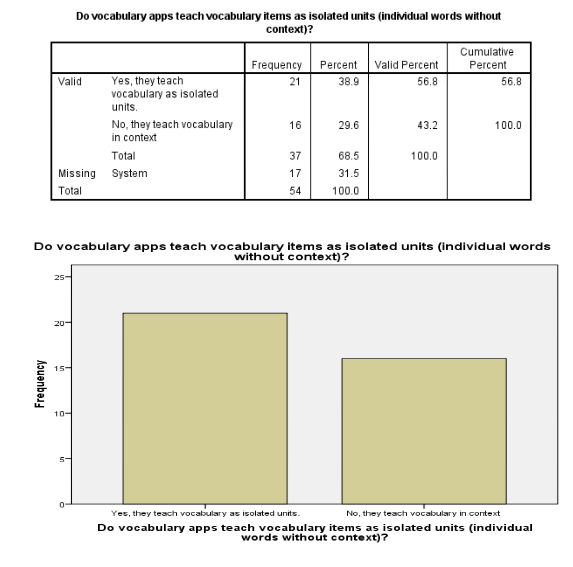
Majority of the respondent, 56.76% said that teaching process followed by the vocabulary apps used isolated units. However, 43.24% of the respondents said that mobile applications tend to teach vocabulary in context.
Table 41: Explanations Regarding Mistakes Not Marked
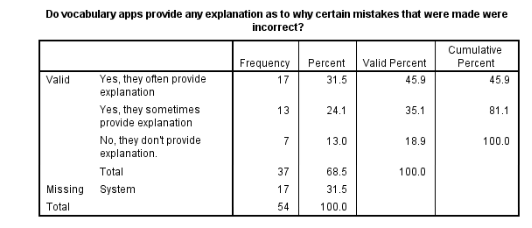
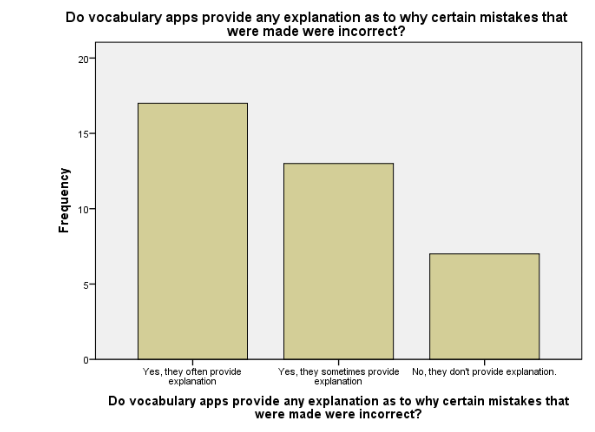
From the above table, it can be seen that majority of the respondent, 45.95% said that vocabulary learning applications often provides explanation for the mistakes not marketed while 35.14% of the respondents said that sometimes provides such explanation. On the other hand, 18.92% of the respondents said that they do not provide any explanation for the mistakes not marked.
Table 42: Lack of Interest in Using Vocabulary Learning Apps
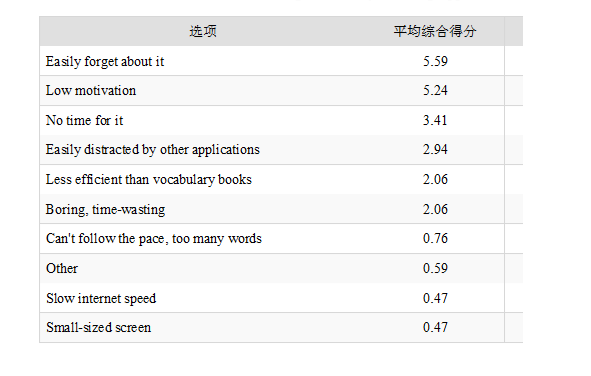
The respondents were asked about the reasons that results in losing their level of interest towards the use of vocabulary learning apps. In this case, maximum score was secured from customer for factors like that they tend to easily forget about it, suffer from low motivation, does not have enough time to use and easily get distracted by other applications respectively.
Interview Analysis
The data collected using interview method from 6 respondents has been analysed using thematic analysis method. Thematic analysis is a qualitative method that helps in subjective interpretation of data based on certain themes that has been identified from the collected data set. The themes considered for the purpose of analysing the effectiveness of vocabulary learning apps based on the interview data are as follows:
Extent of Usage
According to respondents, a large number of vocabulary learning apps are available in the present-day context. However, the usage tendency of such apps largely depends on the students and their degree of preference towards learning English vocabulary from there. The primary factors underlying the usage tendency of these apps are primarily identified to depend on how capable are in terms of explaining to the students every detail. Furthermore, it also comprises of offering students with several exercises to support consolidated vocabulary learning process. It can turn out to be highly beneficial if students invest adequate amount of time and dedication in terms of learning and developing their English vocabulary skills.
Effectiveness
The mobile app focussed learning process seems to be very effective as the respondents highlighted that it offers students with flexible learning interface. A student with the use of a vocabulary leaning app can go ahead in enhancing their knowledge scope. Furthermore, it is not only restricted to only vocabulary, instead it also helps students in terms of developing their ability to speak and listen and even improve grammatical errors too. As a result, the vocabulary leaning apps provide an extensive platform for the students to undergo rapid development in making individuals expert with the language. The respondents have highlighted how students are no longer required to rely only on the teachers for the purpose of developing their skills and abilities in English. It thereby contributes to the process of developing self-learning ability among the students. Furthermore, students can access it free of cost and make themselves master English vocabulary.
Feasibility
The respondents during the interview session has highlighted that the feasibility of the vocabulary learning apps for the contemporary college students is highly significant. It provides students with very good explanation for everything and also educate them about root affixes too. The learning process is presented in a manner that does not develop any form of pressure on the students. They are able to easily memorise the words without experiencing much difficulty. Furthermore, it allows students to easily guess the meaning of words through a series of interactive activities. The entire learning process seems to be very interesting and feasible in terms of developing English vocabulary.
Facilitate Teaching
The vocabulary learning apps are of immense significance in terms of facilitating the process of learning. It serves as suitable medium of translation, that the teachers experience as a part of teaching. The overall scope of learning is so significant and vast that it is in a position to help students determine their ability to read, write and even speak English fluently. In doing so, students are capable of developing their vocabulary largely through a completely different experience altogether.
Timesaving
The learning process of vocabulary learning apps tends to save a large amount of time for the students. It is due to the fact that it offers students with a flexible learning environment followed by presenting the materials to learn in an easier manner. The textbook content is easily available for the students and they can get engaged in the learning process at any point of time. It provides a suitable environment for students to cope up with the lessons in a hassle free and convent manner. It is enriched with wide range of resources for the purpose of enhancing the knowledge scope of students.
Motivation
The students are primarily motivated due to the interactive learning session offered by the vocabulary learning apps. Furthermore, the benefits that the apps tend to offer to the customer’s plays the primary role of motivating them to go ahead with its usage. The entire learning process is found to take place in a positive cycle, and thereby ensures retaining the motivation level of the students largely and with high degree of effectiveness.





